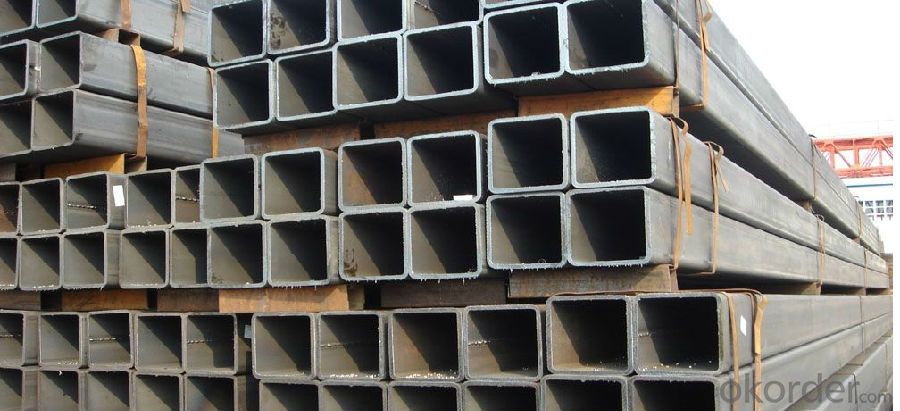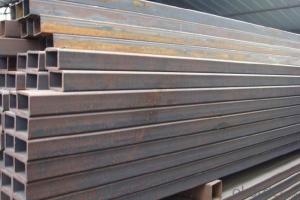Steel Pipe --Various Standard Rectangular Steel Tube
- Loading Port:
- Tianjin
- Payment Terms:
- TT OR LC
- Min Order Qty:
- 25 m.t.
- Supply Capability:
- 6000 m.t./month
OKorder Service Pledge
OKorder Financial Service
You Might Also Like
1、Structure of Rectangular Steel Pipe ASTM A53:
Welded Steel Pipe is to be used for conveying gas, water, and petroleum foroil and natural gas industries. And used for structural steel pies purpose. As the manufacturing process does not include any welding, seamless pipes are perceived to be stronger and more reliable. Historically seamless pipe was regarded as withstanding pressure better than other types, and was often more easily available than welded pipe.
2、Main Features of Rectangular Steel Pipe ASTM A53:
• High manufacturing accuracy
• High strength
• Small inertia resistance
• Strong heat dissipation ability
• Good visual effect
• Reasonable price
3、Rectangular Steel Pipe ASTM A53 Specification:
Standard | GB, DIN, ASTM ASTM A106-2006, ASTM A53-2007 |
Grade | 10#-45#, 16Mn 10#, 20#, 45#, 16Mn |
Thickness | 8 - 33 mm |
Section Shape | Round |
Outer Diameter | 133 - 219 mm |
Place of Origin | Shandong, China (Mainland) |
Secondary Or Not | Non-secondary |
Application | Hydraulic Pipe |
Technique | Cold Drawn |
Certification | API |
Surface Treatment | factory state or painted black |
Special Pipe | API Pipe |
Alloy Or Not | Non-alloy |
Length | 5-12M |
Outer Diameter | 21.3-610mm |
Grade | 20#, 45#, Q345, API J55, API K55, API L80, API N80, API P110, A53B |
Standard | ASME, ASTM |
1) Material:20#(ASTM A 106/A53 GRB.API5LGRB,GB),45#,16Mn,10#.
2) Specification range:OD:21.3-610mm,WT:6-70mm,length:6-12m or according to the requirement of clients.
3) Excutive standards:GB,ASME API5L.ASTM A 106/A53,Despite of the above standards,we can also supply seamless steel pipe with standard of DIN,JIS,and so on,and also develop new products according to the requirements of our clients!
4) Surface:black lacquered,varnish coating or galvanized.
5) Ends:Beveled or square cut,plastic capped,painted.
6) Packing:bundles wrapped with strong steel strip,seaworthy packing.
4、Packaging & Delivery
Packaging Details: | seaworthy package,bundles wrapped with strong steel strip |
Delivery Detail: | 15-30days after received 30%TT |
5、FAQ of Rectangular Steel Pipe ASTM A53:
①How is the quality of your products?
Our products are manufactured strictly according to national and internaional standard, and we take a test
on every pipe before delivered out. If you want see our quality certifications and all kinds of testing report, please just ask us for it.
Guaranteed: If products’ quality don’t accord to discription as we give or the promise before you place order, we promise 100% refund.
②How about price?
Yes, we are factory and be able to give you lowest price below market one, and we have a policy that “ for saving time and absolutely honest business attitude, we quote as lowest as possible for any customer, and discount can be given according to quantity”,if you like bargain and factory price is not low enough as you think, just don’t waste your time.Please trust the quotation we would give you, it is professional one.
③Why should you chose us?
Chose happens because of quality, then price, We can give you both.Additionally, we can also offer professional products inquiry, products knowledge train(for agents), smooth goods delivery, exellent customer solution proposals.Our service formula: good quality+good price+good service=customer’s trust
SGS test is available, customer inspection before shipping is welcome, third party inspection is no problem.
6、 Rectangular Steel Pipe ASTM A53 Images:

- Q:Can steel pipes be painted?
- Yes, steel pipes can be painted. The process typically involves cleaning and preparing the surface, applying a primer, and then using a suitable paint or coating to achieve the desired finish.
- Q:How are steel pipes used in the manufacturing of solar power systems?
- Steel pipes are used in the manufacturing of solar power systems primarily for structural support and to house electrical wiring. They provide a sturdy framework for mounting solar panels, ensuring stability and durability. Additionally, steel pipes are utilized for underground wiring installations, protecting the electrical connections within the solar power system.
- Q:What are the different types of steel pipe end connections?
- There are several types of steel pipe end connections, including threaded, socket weld, butt weld, flanged, and grooved connections.
- Q:What does "HBB" glass steel pipe mean?
- HBB glass fiber reinforced plastic cable protection tube is suitable for power, communication and communication cables laying protection pipes in all kinds of occasions. Especially in the traffic crossing through cable and cable bridge across the river, the use of the special environment, more fully reflects its simple construction, high strength performance, widely used in the construction of infrastructure, transportation, electricity, communications and other fields of Civil Aviation Airport
- Q:Can steel pipes be used for underground fire protection systems?
- Yes, steel pipes can be used for underground fire protection systems. Steel pipes are commonly used in underground applications due to their durability, strength, and resistance to corrosion. They provide an effective means of delivering water for fire suppression in underground areas, ensuring the safety of the surrounding infrastructure.
- Q:What is the difference between internal threading and external threading of steel pipes?
- Internal threading and external threading are two different methods used to create threads on steel pipes. The main difference between them lies in the location of the threads. Internal threading refers to the process of cutting threads on the inside surface of a steel pipe. This method involves using a tool or a die to remove material from the inner diameter of the pipe, creating a helical groove. The resulting threads can be used to connect the pipe to other components, such as fittings or valves. On the other hand, external threading involves cutting threads on the outside surface of a steel pipe. This process usually requires the use of a threading die or a lathe to remove material from the outer diameter of the pipe, leaving behind a helical groove. The external threads allow the pipe to be connected to other components or fittings that have corresponding internal threads. The choice between internal and external threading depends on the specific application and the requirements of the project. Internal threading is often preferred when the pipe needs to be connected to components that have external threads, such as fittings or valves. External threading, on the other hand, is typically used when the pipe needs to be connected to components with internal threads, or when the pipe is intended to be screwed into a threaded hole or coupling. In summary, the main difference between internal threading and external threading of steel pipes is the location of the threads – internal threads are cut on the inside surface of the pipe, while external threads are cut on the outside surface. The choice between these methods depends on the specific application and the type of connections required.
- Q:How are steel pipes used in the manufacturing of sewage treatment plants?
- Steel pipes are commonly used in the manufacturing of sewage treatment plants for various purposes such as conveying wastewater, transporting chemicals and gases, and facilitating the distribution of treated water. They provide durability, corrosion resistance, and structural stability necessary for the efficient and reliable operation of sewage treatment processes.
- Q:Can steel pipes be used for sewage disposal systems?
- Yes, steel pipes can be used for sewage disposal systems. Steel pipes are commonly used in sewage systems due to their durability, resistance to corrosion, and ability to withstand high pressure. They are suitable for carrying wastewater and sewage safely and efficiently.
- Q:What is the maximum allowable deflection for steel pipes?
- The maximum allowable deflection for steel pipes depends on various factors such as pipe diameter, wall thickness, material strength, and the intended application. It is typically determined by industry standards and specific engineering considerations.
- Q:How are steel pipes used in the construction of solar power plants?
- Steel pipes are commonly used in the construction of solar power plants to support the installation of solar panels and to carry the flow of fluids, such as water or steam, within the plant. They provide structural integrity and durability necessary to withstand the environmental conditions and weight of the solar panels. Additionally, steel pipes are used for the installation of underground transmission lines, ensuring efficient and reliable electricity distribution from the solar power plant to the grid.
1. Manufacturer Overview |
|
|---|---|
| Location | |
| Year Established | |
| Annual Output Value | |
| Main Markets | |
| Company Certifications | |
2. Manufacturer Certificates |
|
|---|---|
| a) Certification Name | |
| Range | |
| Reference | |
| Validity Period | |
3. Manufacturer Capability |
|
|---|---|
| a)Trade Capacity | |
| Nearest Port | |
| Export Percentage | |
| No.of Employees in Trade Department | |
| Language Spoken: | |
| b)Factory Information | |
| Factory Size: | |
| No. of Production Lines | |
| Contract Manufacturing | |
| Product Price Range | |
Send your message to us
Steel Pipe --Various Standard Rectangular Steel Tube
- Loading Port:
- Tianjin
- Payment Terms:
- TT OR LC
- Min Order Qty:
- 25 m.t.
- Supply Capability:
- 6000 m.t./month
OKorder Service Pledge
OKorder Financial Service
Similar products
New products
Hot products
Related keywords






























